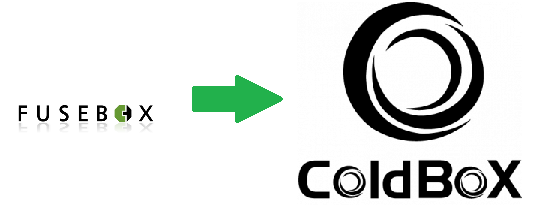 Welcome back to our blog series on converting your legacy FuseBox apps over to ColdBox MVC. In our
Welcome back to our blog series on converting your legacy FuseBox apps over to ColdBox MVC. In our
Converting Fusebox 5.1 Sample App to ColdBox MVC


 Welcome back to our blog series on converting your legacy FuseBox apps over to ColdBox MVC. In our
Welcome back to our blog series on converting your legacy FuseBox apps over to ColdBox MVC. In our

 Welcome back to our blog series on converting your legacy FuseBox apps over to ColdBox MVC. In our
Welcome back to our blog series on converting your legacy FuseBox apps over to ColdBox MVC. In our

In our last installment, we talked about the benefits of converting legacy FuseBox applications over to ColdBox MVC. In this entry we'll actually convert the Fusebox 3 sample app available from fusebox.org to show you the similiarities and differences between the two frameworks.
Here's a screenshot of the files in the Fusebox and ColdBox code side-by-side. Both are pretty self-explanatory, so we'll work our way through the contents of each file as we go.

In our last installment, we talked about the benefits of converting legacy FuseBox applications over to ColdBox MVC. In this entry we'll actually convert the Fusebox 3 sample app available from fusebox.org to show you the similiarities and differences between the two frameworks.
Here's a screenshot of the files in the Fusebox and ColdBox code side-by-side. Both are pretty self-explanatory, so we'll work our way through the contents of each file as we go.

In our last installment, we talked about the benefits of converting legacy FuseBox applications over to ColdBox MVC. In this entry we'll actually convert the Fusebox 3 sample app available from fusebox.org to show you the similiarities and differences between the two frameworks.
Here's a screenshot of the files in the Fusebox and ColdBox code side-by-side. Both are pretty self-explanatory, so we'll work our way through the contents of each file as we go.

One of the newest features of ContentBox is the ability to define related content for Entries, Pages, and ContentStore objects. Whether it's simply rendering a list of related content links, or creating complex data relationships for use in custom development, the sky is the limit for how you can use this new feature within your ContentBox apps!
Adding related content to your content is simple. While adding or editing your conten...

One of the newest features of ContentBox is the ability to define related content for Entries, Pages, and ContentStore objects. Whether it's simply rendering a list of related content links, or creating complex data relationships for use in custom development, the sky is the limit for how you can use this new feature within your ContentBox apps!
Adding related content to your content is simple. While adding or editing your conten...

Fusebox is on e of the oldest frameworks for ColdFusion. My first real ColdFusion job was working on a large intranet site built upon Fusebox. The framework has changed hands several times and though it has now gone cold in terms of new development but it is still used by 1 in 3 ColdFusion developers according to the State of the CF Union survey results from 2014.
e of the oldest frameworks for ColdFusion. My first real ColdFusion job was working on a large intranet site built upon Fusebox. The framework has changed hands several times and though it has now gone cold in terms of new development but it is still used by 1 in 3 ColdFusion developers according to the State of the CF Union survey results from 2014.
There's a lot of legacy code out there still running on FuseBox, but that doesn't mean it has to stay that way. The Internet has moved on to design patterns like MVC and more-object oriented approaches for code reuse and testing. The thought of reworking your old codebase might seem scary, especially if you're not familiar with MVC and you aren't using any OO principles. Don't despair though, it's often times better to make incremental improvements to code instead of trying to throw it out and rewrite it from scratch. The old adage says, how do you eat an elephant? "One bite at a time!"

Fusebox is on e of the oldest frameworks for ColdFusion. My first real ColdFusion job was working on a large intranet site built upon Fusebox. The framework has changed hands several times and though it has now gone cold in terms of new development but it is still used by 1 in 3 ColdFusion developers according to the State of the CF Union survey results from 2014.
e of the oldest frameworks for ColdFusion. My first real ColdFusion job was working on a large intranet site built upon Fusebox. The framework has changed hands several times and though it has now gone cold in terms of new development but it is still used by 1 in 3 ColdFusion developers according to the State of the CF Union survey results from 2014.
There's a lot of legacy code out there still running on FuseBox, but that doesn't mean it has to stay that way. The Internet has moved on to design patterns like MVC and more-object oriented approaches for code reuse and testing. The thought of reworking your old codebase might seem scary, especially if you're not familiar with MVC and you aren't using any OO principles. Don't despair though, it's often times better to make incremental improvements to code instead of trying to throw it out and rewrite it from scratch. The old adage says, how do you eat an elephant? "One bite at a time!"

Fusebox is on e of the oldest frameworks for ColdFusion. My first real ColdFusion job was working on a large intranet site built upon Fusebox. The framework has changed hands several times and though it has now gone cold in terms of new development but it is still used by 1 in 3 ColdFusion developers according to the State of the CF Union survey results from 2014.
e of the oldest frameworks for ColdFusion. My first real ColdFusion job was working on a large intranet site built upon Fusebox. The framework has changed hands several times and though it has now gone cold in terms of new development but it is still used by 1 in 3 ColdFusion developers according to the State of the CF Union survey results from 2014.
There's a lot of legacy code out there still running on FuseBox, but that doesn't mean it has to stay that way. The Internet has moved on to design patterns like MVC and more-object oriented approaches for code reuse and testing. The thought of reworking your old codebase might seem scary, especially if you're not familiar with MVC and you aren't using any OO principles. Don't despair though, it's often times better to make incremental improvements to code instead of trying to throw it out and rewrite it from scratch. The old adage says, how do you eat an elephant? "One bite at a time!"